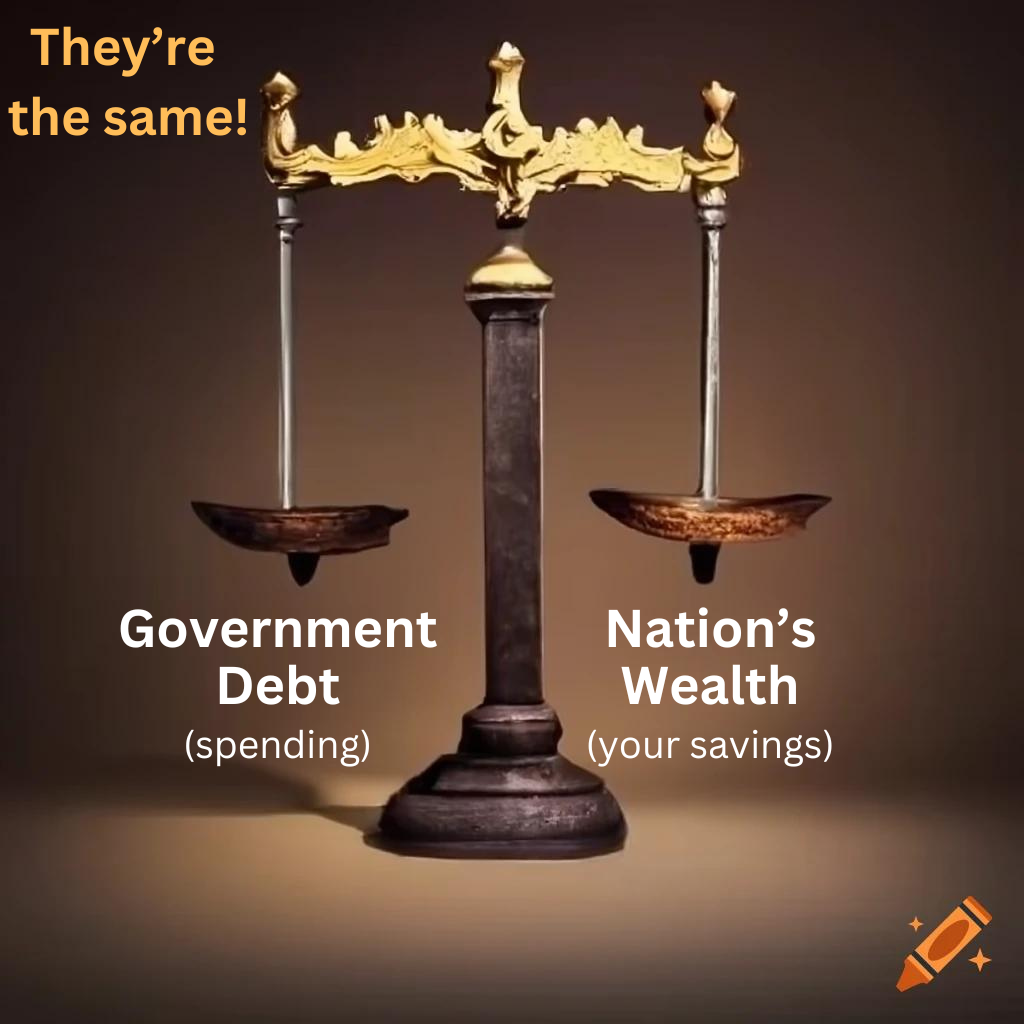National Debt key points
- The National Debt is not a debt, it is not “owed” back
- The National Debt is money in the economy that has not yet been taxed back
- The National Debt represents our saving, the money in our pockets
- The National Debt is used to pay for our security (military spending), law and order (policing and courts), healthcare (hospitals), education, public services
- The National Debt is not funded from taxing. Parliament decides how much money the government spends.
Description
Politicians have been quick to describe the “National Debt” as a gaping “black hole” that requires significant “funding” and “tax rises” to pay for public services.
It is all nonsense. Firstly, the “National Debt” is a deficit, not a debt, it is literally the money in your pocket, the government’s investment in the country, and does not need repaying. It is exactly equivalent to all the money in the economy. It is our wealth. It is not that the National Debt needs to be or should be paid back, it is actually impossible to pay off the National Debt as it would require us to empty our bank accounts, and give the money back to the government. It can’t happen.
Since the “National Deficit” is equivalent to the wealth of the country, it can not be described as a “black hole” (or fiscal hole) that requires filling. Indeed, to fund the National Deficit means to take money out of the economy and out of your pocket! This only results in austerity (see: MMT: The alternative to austerity).
Raising taxes (for rich and poor alike) also takes money out of the economy. Taxes do not fund spending, and never have (see: MMT: Taxes do not fund spending).
British M.P. John Redwood wrote:
“I have not been worried about the state deficit for sometime, ever since Mr Brown found out that the UK state can literally print money to pay its bills.” (John Redwood blog)
Countries with monetary sovereignty can not default
Not only does the National Debt not need paying back, but countries with monetary sovereignty can not default on the money they “owe”. Who says:
“The United States can pay any debt it has because we can always print money to do that. So there is zero probability of default.” Alan Greenspan (CNBC, August 2011)
“In the case of United States, default is absolutely impossible. All U.S. government debt is denominated in U.S. dollar assets.” Peter Zeihan, Vice President of Analysis for STRATFOR (Insider, April 2011)
“In the case of governments boasting monetary sovereignty and debt denominated in its own currency, like the United States (but also Japan and the UK), it is technically impossible to fall into debt default.” Erwan Mahe, European asset allocation and options strategies adviser (seekingalpha, Apr 2011)
“There is never a risk of default for a sovereign nation that issues its own free-floating currency and where its debts are denominated in that currency.” Mike Norman, Chief Economist for John Thomas Financial
“There is no inherent limit on federal expenses and therefore on federal spending…When the U.S. government decides to spend fiat money, it adds to its banking reserve system and when it taxes or borrows (issues Treasury securities) it drains reserves from its banking system. These reserve operations are done solely to maintain the target Federal Funds rate.” Monty Agarwal , managing partner and chief investment officer of MA Managed Futures Fund
“As the sole manufacturer of dollars, whose debt is denominated in dollars, the U.S. government can never become insolvent, i.e., unable to pay its bills. In this sense, the government is not dependent on credit markets to remain operational.” Federal Reserve Bank of St. Louis, Oct 2011
“A sovereign government can always make payments as they come due by crediting bank accounts — something recognized by Chairman Ben Bernanke when he said the Fed spends by marking up the size of the reserve accounts of banks.” L. Randall Wray, Professor of Economics at the University of Missouri-Kansas City and a Senior Scholar at the Levy Economics Institute (New York Times, Apr 2011)
Motives
Why does the government describe the National Debt as a black hole when it is clearly not? There are two options:
- The government is ignorant of basic economics (unlikely with advisors)
- The government is making deliberate political decisions using emotive vocabulary and ideas for their own ends
Who is set to gain if the government reduces public spending? Answer: The private sector, where profits dominate thinking, and people come second.
See Also
- “Economists question ‘black hole’ in UK finances“, Andy Verity, BBC News, 10 Nov 2022
- “There is no ‘black hole’“, Prof. Richard Murphy, Tax Research, November 8 2022
- “The black hole in Britain’s public finances is a myth“, Prof Mary Mellor, The Guardian, Mon 7 Nov 2022
- “Don’t let the black hole debt doomsters suck us in with their lies. Enough is enough.”, The Gower Initiative for Modern Money Studies, 6th November 2022
- “Tax rises for everyone to help plug ‘eye-watering’ black hole, Chancellor Jeremy Hunt to warn“, Jane Merrick, iNews, October 31, 2022
- “Explainer: what is modern monetary theory?“, Steven Hail, Lecturer in Economics, University of Adelaide, January 31, 2017
Video

Why we need to debunk the ‘deficit myth’
Featuring Stephanie Kelton, 29 June 2020 @ BBC.co.uk.
Click to open and start in a new window
Stephanie Kelton – The Angry Birds Approach to Understanding Deficits in the Modern Economy (2015)

